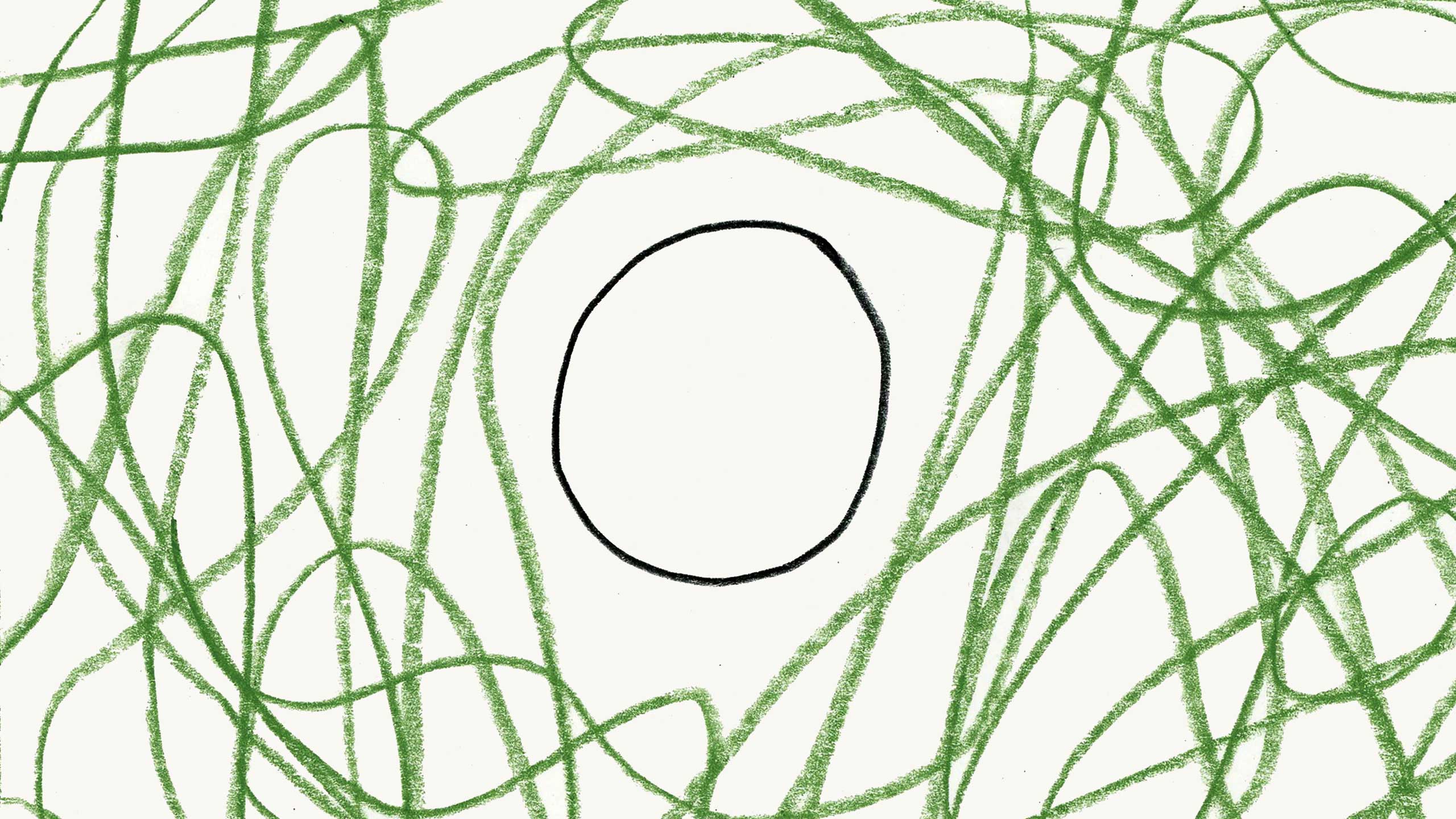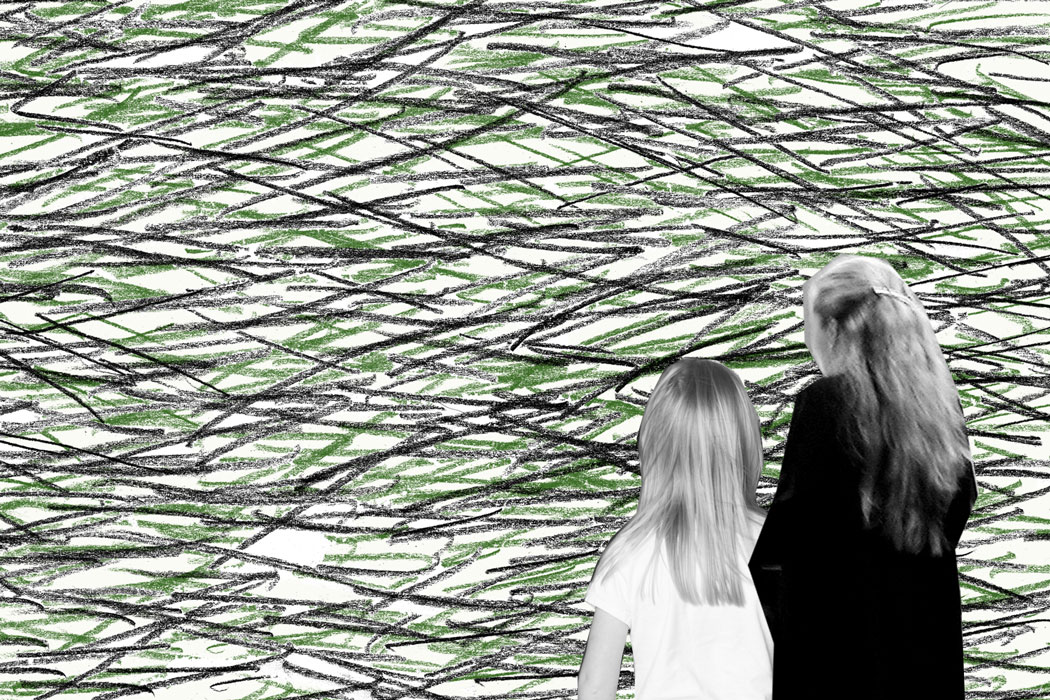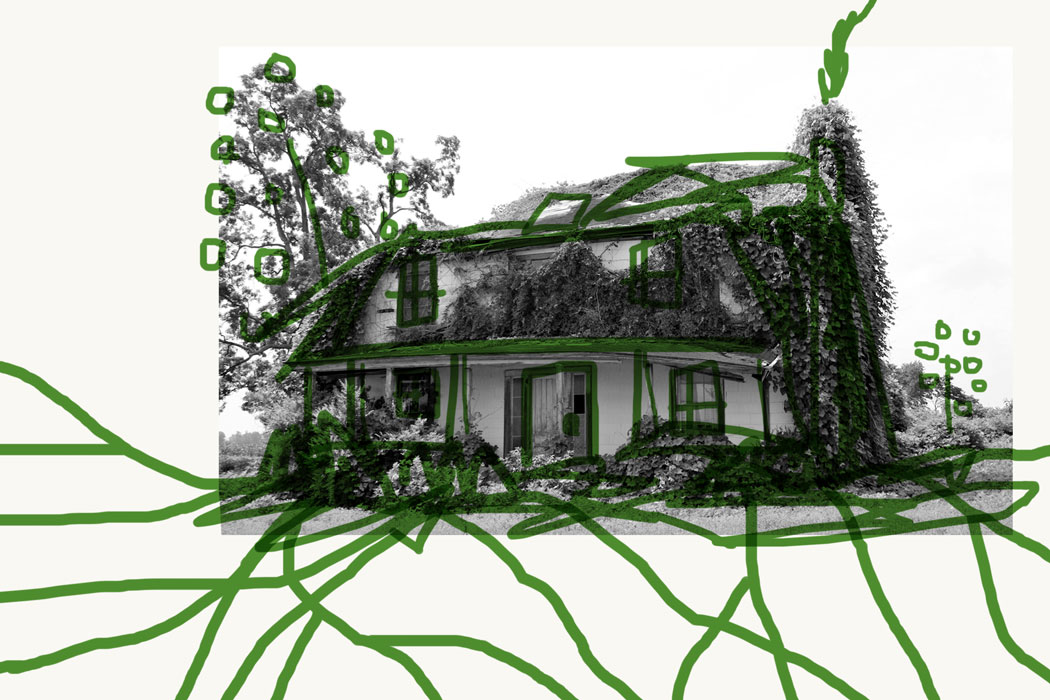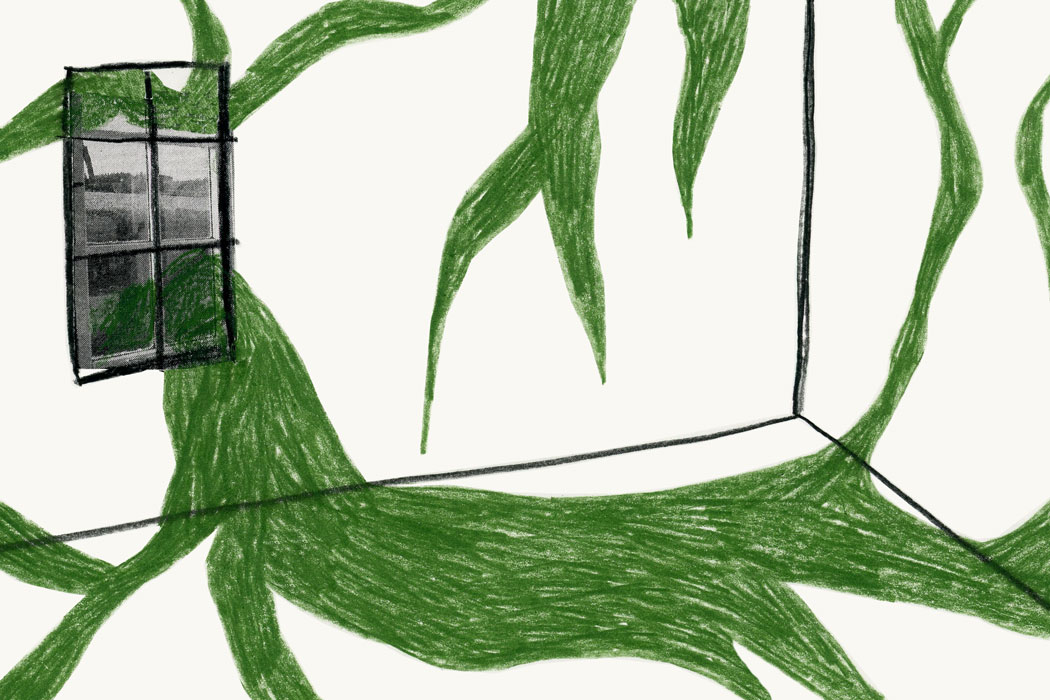Finalist for the Chicago Review of Books Fiction Award, Dan Chaon's Best of 2017 pick in Publishers Weekly, one of Vol. 1 Brooklyn's Best Books of 2017, a BOMB Magazine "Looking Back on 2017: Literature" Pick, and one of Vulture's 10 Best Thriller Books of 2017.
Jac Jemc's The Grip of It is a chilling literary horror novel about a young couple haunted by their newly purchased home
Touring their prospective suburban home, Julie and James are stopped by a noise. Deep and vibrating, like throat...

To celebrate Short Story Month, we’re publishing a new short story every week in May here and at mcdbooks.com. This week, we are delighted to publish an original story by the inimitable Jac Jemc (author of The Grip of It) from her forthcoming collection, False Bingo. In “Kudzu” we see a mother and daughter doing normal mother and daughter things while living off the grid in a house completely colonized by the kudzu plant, “a fairytale created by nature.” One of the coolest things about Jac Jemc’s writing is how seamlessly she moves from tenderness to eeriness–they’re able to exist on the the same plane, in the same character, in the reader’s throat. Enjoy.
“We’re the invasive species.” That’s what I tell my daughter while we hack through the vines into the light. For seventeen years, we lived in a dark house, uninterrupted, the tendrils burying us deeper, until from outside, I’m sure it appeared our home wasn’t a home at all, but the simulacrum of a home, a topiary to remind passers-by of a cottage, a fairytale created by nature.
How long must something be kept from its natural habitat before it becomes foreign again? If the dodo bird were reintroduced within the current balance of our ecosystem, could it survive? Would it threaten other species?
Just after I pushed my daughter out into the world for the first time, I decided it would be best if we retreated. I would keep her safe from all of the outside harms. I found a cabin on a small bit of land in the forest. Already then, the kudzu had infected the area and so the property values had tumbled. I bought two goats, a sheep, some chickens, a rooster who we’d need to learn to love. The goats would keep the vines at bay and the vines would keep the house well insulated and shaded: cool in the summer, warm in the winter.
We never used the word “weed.”
I knew it couldn’t last. I knew my daughter would eventually want out of this little world we’d created. I knew she’d go seeking the trouble I’d tried to keep her from, and I knew that was reasonable, but, in the meantime, we lived a happy life. We read. We built. We cultivated, harvested and canned. We played and took long naps. We visited a ranger each week and passed her lists of what we needed, paying her for her time in baskets of vegetables and fresh eggs.
“But how do we pay for the supplies she gets us?” my daughter asked when she was ten. I could hold off the specter of money for only so long.
“We are lucky. Your grandparents were wealthy. If we live lean, mostly off of what we grow and create ourselves, then we will always be taken care of.”
“Where are they now?” she asked and we continued her education on death, building on the idea of why it was important to be careful when walking in the woods, comparing their passing to the birds we’d sometimes find on the forest floor, expanding on the idea of the chicks we waited to hatch and the eggs we ate before they’d have a chance. “And mosquitos and flies and spiders?” She was putting it all together.
“Well, we try not to harm the spiders, right?” I asked and she’d nodded solemnly, though reluctantly. She understood that the spiders would do most of the work controlling the flies and mosquitos if we left them alone, but still, they bothered her. “The kudzu, too, is alive,” I’d said.
“And it dies when the goats eat it?” she’d asked.
“That’s right.”
“But the goats do not eat us.”
“No.”
“And so we are stronger than the kudzu.”
“The kudzu is even stronger than us, and that is why we honor it,” I’d said.

The next day, I’d made it our project to dig up a full root crown of a kudzu vine, scooping the dirt away carefully to uncover its many arms tracing it’s path far and wide, deeper and deeper, until my daughter looked up at me and said, “Yes, I understand. The kudzu goes on forever.”
“Eternity powered by sunlight and chaos,” I said.
Shrieking strains of cunning. Traces turned to choking. On days when I felt frustrated and afraid that even I could not keep my daughter safe, I feared the kudzu. I made metaphors and wondered if they applied to us or to the thick vines wrapping our home: outcasts on attack.
“Cultivating the land toward our own ends is its own kind of conquest, our own sort of colonization and assault,” I reminded her and she asked again where we could go that was truly ours, somewhere that hadn’t been wrested from the control of another. I’d instilled in her that wherever we were, someone or something else else had been there first.
On our walks, we’d occasionally run into a hiker. We never warned people off our land because we were never warned off other people’s land. My daughter would wave and sometimes people would stop to talk. Sometimes when she was young, she’d roam naked, and people would smile, assuming we were camping nearby.
“Is there a good swimming hole around here?” they’d ask, and we’d lead the way and then depart, letting them have their privacy.
“Can you point me to the closest road access?” Sometimes we’d give directions, but sometimes we could tell the hiker desperately lacked skill, and so we’d walk them to the pavement, my daughter always shocked at the way the vines blazed along the edge of the road, stopping shy, maybe an experimental finger crawling out, only to be scared back, by a semi or a mower or a spray of poison. If people didn’t know what they were looking at they thought it was beautiful, but most experienced hikers saw the vines as a blight, an unfortunate effect they blamed on globalization, on our ineptitude at trying to share our cultures.
“Not quite,” my daughter would say, once she’d reached age thirteen.
“The Japanese brought it over,” the hikers might say, sure they were helping my daughter learn.
“Well, that’s a case of revisionist history if there ever was one. Kudzu was indeed showcased at the Japanese Pavilion at the Centennial Exhibition in 1876, but it didn’t become an issue until the 1930s when it was marketed to farmers as a way to slow soil erosion. It’s no one’s fault but our own. We told farmers to plant kudzu, as much as they could afford.”
The hikers would look at me for confirmation and I’d nod. Depending on their politics they might say something that led to a private conversation between me and my daughter later that afternoon on hate speech or on how even the best intentioned people sometimes stopped short of looking for the truth.
The kudzu had a swagger we admired. When it crept in between the siding, we’d spend an afternoon clipping it back, letting the goats feast. We’d dry out thicker vines inside the cabin and save it for burning in the winter, save thinner vines to weave baskets we could take to the ranger. She’d fill her truck’s bed and drop them off at the general store in town to be sold. We kept all the proceeds from those sales in a lockbox for my daughter’s future. “But we don’t need the money,” she’d say.
“Someday you might choose to live a different type of life,” I told her, avoiding the true fear behind my words, that someday I might die, that I had only worked out how to stretch the money through my old age. I doubted she would stay in the idyllic cabin with me for the rest of her life, but if she did, I didn’t ever want her to feel stranded. I had gone to college and gotten little out of it, but if she felt that she wanted that experience, I wasn’t seeking to deny her that.

On her seventeenth birthday, she started crying the minute she woke up.
“What’s the matter?” I asked, pulling her into my lap like I had for all her life, both of us growing stronger day-by-day.
“I only have one more year with you,” she said.
“Well, you can stay as long as you like. You know that, but being on your own would be great, too.” I’d promised myself not to be so protective as to stunt her when she decided her time in our cabin was up.
“I know, but it feels so close now.”
I cried, too. “You’re ready. You’ve learned what you can from me, but there’s more to know, and you can always come home.”
×
I remembered taking the train when I was a kid, the way the bug-eyed Amish teens stared at my laptop. I remembered how unassimilated they seemed and wondered if that is how my daughter would look to the outside world. Had we started to communicate in ways that seemed strange and unapproachable?
I asked the ranger to get us bikes and we started to go into town occasionally at first and then every day. We ordered tea in cafes and visited the library to use the computers. I was surprised how quickly my daughter picked up the skills she would need. A boy asked her on a date and she took down his phone number, with no way of calling it. We asked about a pay phone, but no one knew of one still in working condition. “Is it a local call? You can use our phone,” the librarian said.
Back at home I asked her if she thought she’d call him.

“I don’t think so. I’ve been thinking I might like women.” She seemed confident in her uncertainty and I was proud of her for knowing that this revelation would matter little to me.
“You could see if he’d be open to friendship, but a man’s feelings are easily hurt in such exchanges, so it’s up to you if you want to deal with however his ego reacts,” I said. I thought it might be a good time for her to make a friend, but with a little effort he surely wouldn’t be the only option.
At the coffee shop the next day she asked the barista if she’d like to hang out sometime. The barista seemed enthusiastic. “Definitely. Want to give me your number?”
I tried not to eavesdrop, but I found my ears leaning over. It was such a pleasure to hear my daughter talking to someone else, trying something out. It reminded me of when she was a baby, testing sounds and words to see what reaction they’d elicit.
“I don’t really have one,” my daughter said.
“So cool. I’ve been thinking about doing that, too,” the barista said. “Um, want to plan on Friday then? I get off at around nine, so we could meet here?”
“Cool,” my daughter said. “I’m Bug.” It wasn’t the name I’d given her, and I felt the first pang of what it would be to live without her.
“Bug? Amazing. I’m Kate. I’ll see you then if not before, I guess.” Kate gave Bug a half-wave and Bug mimicked the gesture with assuredness. I was amazed at how easily it all worked.
“I need a light for my bike if I’m going to ride at night,” Bug said on our way out, and we stopped at the hardware store for a headlamp.
While she rode home next to me, I said, as nonchalantly as I could muster, “Bug, you know that you might attach to people pretty quickly because it’s just been you and me.”
“I was thinking about that,” she said. “All I can do is go in aware.”
Back at home, I made us tea on the stove, and we spooned in honey that tasted like the bubblegum pollen of the kudzu flowers, proof that even when the rest of the forest hadn’t blossomed, the bees had found what they’d needed to live.
